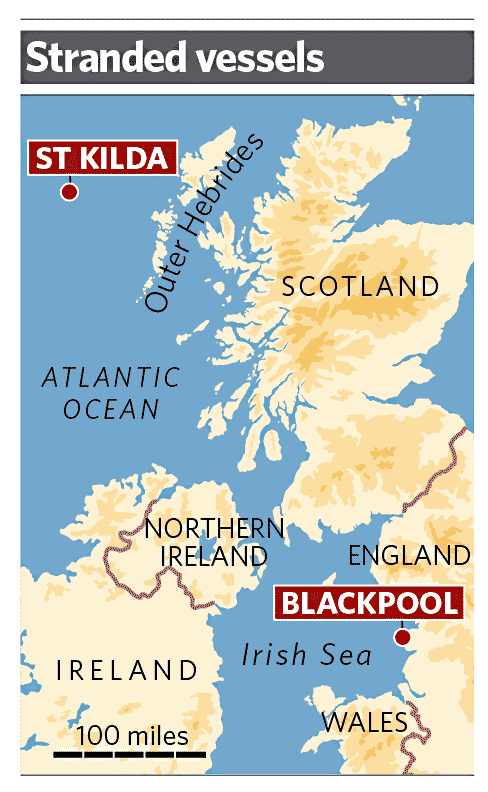Desperate efforts to refloat stricken ships as environmental fears grow

Your support helps us to tell the story
From reproductive rights to climate change to Big Tech, The Independent is on the ground when the story is developing. Whether it's investigating the financials of Elon Musk's pro-Trump PAC or producing our latest documentary, 'The A Word', which shines a light on the American women fighting for reproductive rights, we know how important it is to parse out the facts from the messaging.
At such a critical moment in US history, we need reporters on the ground. Your donation allows us to keep sending journalists to speak to both sides of the story.
The Independent is trusted by Americans across the entire political spectrum. And unlike many other quality news outlets, we choose not to lock Americans out of our reporting and analysis with paywalls. We believe quality journalism should be available to everyone, paid for by those who can afford it.
Your support makes all the difference.The severe weather that caused a ferry and a trawler to run aground as gales battered Britain turned even colder yesterday as much of Scotland and northern England was left covered in a thick blanket of snow.
Although much of southern England was bathed in clear winter sunshine, up to 20cm of snow fell across the Highlands, the Borders and much of northern England as a bitterly cold Arctic weather front made its way south through the course of the day.
High winds of up to 50mph continued for a second day, causing further power cuts, road closures and disruption to drivers and travellers.
Scotland bore the brunt of the cold weather, with 1,000 homes in Dumfries, Galloway and Lanarkshire left without electricity because of the adverse weather. Ferry routes were also widely disrupted and many bridges were closed to high-sided vehicles.
The winds also hampered efforts to further secure the two vessels that ran aground on Thursday night. All crew on the Riverdance, which ran aground near Blackpool, and the British registered Spinningdale, – which lies stricken on rocks off the St Kilda archipelago near the Outer Hebrides – were dramatically saved, but rescuers have warned that now both vessels pose an environmental risk to the areas where they lie stranded.
There is concern that the Riverdance may spill some of the 150 tonnes of fuel it is carrying unless it is refloated soon, while oil on board the Spinningdale poses an environmental risk to the ecologically sensitive St Kilda archipelago, which is a twice listed World Heritage site. Two of the crew rescued from the Spinningdale are being treated for hypothermia on Stornoway.
Yesterday helicopters circled over the north shore of Blackpool beach and roads were closed as police and coastguard teams discussed how they would re-float the stricken Riverdance.
But aside from the rescuers, most of the crowd were mere spectators, gathered on the Fleetwood coast interested only in taking pictures of the giant truck ferry washed up just 400 yards from the seafront – it has become Blackpool's newest seaside attraction.
"It's very exciting isn't it?" said Margaret Dutton, pulling her woolly hat down to protect her ears from the high winds. "We had to come down to have a look and it seems like everyone has had the same idea. I've lived here pretty much all my life and something like this hasn't happened for ages. It's been about 30 years, I'd say." Mrs Dutton, from Little Bispham, Lancashire, gripped her binoculars tightly as she watched waves continue to crash against the giant cargo ship. Listing at a 60 degree angle, the lorries the Riverdance had been carrying clung precariously to its deck.
"It's certainly got everyone talking," she said. "I think most people are waiting to see what happens next. It's not something you see that often, which is quite surprising because that stretch of water is treacherous." The ship, which had been on its way from Warrenpoint in Northern Ireland to Heysham in Lancashire, was thought to be 12 miles from the coast when it was hit by a wave shortly before 8pm on Thursday night. Immediately helicopters were scrambled and 14 people – four passengers and 10 crew members – were rescued and taken to Blackpool airport. The remaining nine crew members stayed on board before being rescued yesterday morning after power faded and they failed to refloat the ship. John Matthews, from the Fleetwood lifeboat, said: "The conditions were terrible. I've got to say that the two lifeboat crews and the helicopters did a wonderful job. Listening to it on the radio, everything was very calm and professional. I was quite amazed by how calm the master of the ship was. It was a good outcome, considering the horrendous weather. It could have been a lot worse."
Meanwhile, drivers across the country have been warned to be extra careful on the roads this weekend. Last night Durham police launched a rescue operation after at least 150 motorists became stuck in the snow on the A66. Among the vehicles stranded on the road was a coach carrying 40 pensioners.
Meanwhile, a separate rescue operation was launched after the captain of a cargo ship was seriously injured off the Scilly Isles during a force 10 gale last night. Until now Britain had been experiencing some unseasonably warm weather for the time of year but meteorologists say that the cold weather is now expected to stay with us.
"It's going to be a pretty cold and frosty weekend for everyone. The winds will remain gusty," said Helen Chivers of the Met Office.
Join our commenting forum
Join thought-provoking conversations, follow other Independent readers and see their replies
Comments